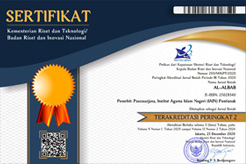Wasathiyyah Islam as the Road to Moderatism in Indonesia
Abstract
Keywords
Full Text:
PDFReferences
Al-Qaradhawi, Y. (1981). Khashais al-Ammah fi al-Islam. Cairo: Maktabah Wahbah.
Al-Thayyib, S. A.-A. A. (2018). Wasathiyyah al-Islam, li al-Hadharah al-‘Alamiyyah; at-Tafkir wa at-tathbiq. Jakarta: Maktab al-Mab’uts al-Khash li Rais Jumhuriyyah Indunisia li al-Hiwar wa at-Ta’awun baina Mu’taniqy al-Adyan wal al-Hadharah wa ats-Tsaqafah.
Ali, M. (2007). Moderate Islam Movement in Contemporary Indonesia. In R. Sukma & C. Joewono (Eds.), Islamic Thoughts and Movements in Contemporary Indonesia. Jakarta: Center for Strategic and International Studies.
Baalbaki, M., & Baalbaki, R. (1999). Al-Mawrid: A Modern Arabic-English Dictionary. Beirut: Dar al-Ilm li al-Malayin.
Bakti, A. F. (2005). Islam and Modernity: Nurcholish Madjid’s Interpretation of Civil Society, Pluralism, Secularization, and Democracy. Asian Journal of Social Science, 33(3), 486–505.
Bakti, A. S. (2016). Deradikalisasi Nusantara; Perang Semesta Berbasis Kearifan Lokal Melawan Radikalisasi dan Terorisme. Jakarta.
Berger, P. (1993). The Social Reality of Religion. Hamondsworth: Penguin.
Bull, V. (2010). Oxford Leaners Pocked Diary. Oxford: Oxford University Press.
Burhani, A. N. (2012). Al-Tawassut wa al-I‘tidal: The NU and Moderatism in Indonesian Islam. Asian Journal of Social Science, 05(06).
Durkheim, E. (1995). The Elementary Forms of The Religious Life. The Free Press of Glencoe.
Esposito, J. L. (2005). Moderate Muslims: A Mainstream of Modernists, Islamists, Conservatives, and Traditionalists. American Journal of Islamic Social Sciences, XXII(03).
Hanafi, M. M. (2013). Moderasi Islam: Menangkal Radikalisasi Berbasis Agama. Jakarta: Ikatan Alumni al-Azhar and Pusat Studi Al-Qur’an.
Hilmy, M. (2013). Whither Indonesia’s Islamic Moderatism? A Reexamination on the Moderate Vision of Muhammadiyah and NU. Journal of Indonesian Islam, 07(01).
Huda, A. (2010). Epistemologi Gerakan Liberalis, Fundamentalis, dan Moderat Islam di Era Modern. Jurnal de Jure: Jurnal Syariah Dan Hukum, 2(2), 178–194.
Ibnu Asyur, M. al-T. (1979). Ushul an-Nizham al-Ijtima‘î fi al-Islam. Tunisia: Al-Sharikah al-Tûnisiyyah li al-Tauzî‘.
Ibnu Asyur, M. al-T. (1984). Al-Tahrir wa al-Tanwir. Tunisia: Dar Al-Tunisiyyah.
Ibnu Asyur, M. al-T. (2001). Maqashid al-Syari‘ah (II). Yordania: Dar an-Nafa’is.
Liptak, K. (2017). Pence Praises Moderate Islam in Indonesia. 2017, April 20.
Muhajir, N. (1994). Metodologi Penelitian Kualitattif. Yogyakarta: Rieke Sarasin.
Rahman, F. (1979). Islam. New York: The Chicago University Press.
Roff, W. R. (Ed.). (1987). Islam and the Political Economy of Meaning. London & New York: Routledge.
Serjeant, R. B. (1964). The Constitution of Medina. Islamic Quarterly 8.
Sholihan. (2008). Modernitas Postmodernitas Agama. Semarang: Walisongo Press.
Sofiuddin, S. (2018). Pusaka Kebangsaan: Sinergitas Islam dan Indonesia. Jakarta: Pustaka Compass.
Sukma, R. (2010). Mengelola Paradoks: Identitas, Citra, dan Posisi Internasional Indonesia. Jurnal Analisis CSIS, 39(4).
Team KBBI. (2014). Kamus Besar Bahasa Indonesia Offline Versi 1.5 lansiran 2010-2013 Edisi III. Jakarta: KBBI.
Umar, A. R. M. (2016). A Genealogy of Moderate Islam: Governmentality and Discourses of Islam in Indonesia’s Foreign Policy. Jurnal Studia Islamika, 23(3).
Wach, J. (1969). The Comparative Study of Religion. Columbia: The Columbia University Press.
Yatim, B. (2010). Sejarah Peradaban Islam. Jakarta: Rajawali Pers.
Zainuddin, M., & Esha, M. I. (2016). Islam Moderat: Konsepsi, Interpretasi dan Aksi. Malang: UIN Maliki Press.
Zakaria, H. A. bin F. (n.d.). Mu’jam Maqayis al-Lughah (6th ed.). Beirut: Dar al-Kutub al-Ilmiah.
Article Metrics
 Abstract views: 2873
Abstract views: 2873
 PDF views: 1454
PDF views: 1454











